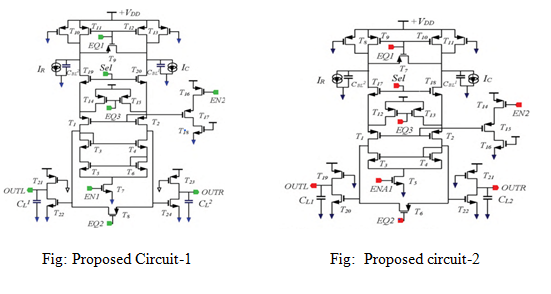Low Power, High Performance PMOS Biased Sense Amplifier
Also Available Domains Cadence EDA|Core Memories|Low Power VLSI
Objective
In this paper, two proposed circuits of PMOS-biased sense amplifier is implemented. A fast access time and low power dissipation are achieved with newly developed circuits of sense amplifier for low voltage supply.
Abstract
In this paper, PMOS biased sense amplifier is proposed. Sense amplifiers plays a significant role in terms of its recital, functionality and reliability of the memory circuits. The proposed circuit is PMOS biased sense amplifier, which provides very high output impedance and has reduced sense delay and power dissipation and it performs the identical operations as that of conventional circuits. The suggested sense amplifiers overall performance have been simulated and examined using Tanner EDA employing 180 nm library parameters.
NOTE: Without the concern of our team, please don't submit to the college. This Abstract varies based on student requirements.
Block Diagram

Specifications
Software Requirements:
Tanner EDA
Technology files: 180nm
Hardware Requirements:
Microsoft® Windows XP
Intel® Pentium® 4 processor or Pentium 4 equivalent with SSE support
512 MB RAM
100 MB of available disk space
Learning Outcomes
- Introduction to Sense Amplifiers
- Types of Sense Amplifiers
- Limitations & Applications.
- Introduction to PMOS Biased sense amplifier.
- Knowledge on Differential amplifiers
- Knowledge on Current Mirror circuits
- Importance of Transistors
- MOS Fundamentals
- NMOS/PMOS/CMOS Technologies
- How to design circuits using Transistor logic?
- Transistor level design for PMOS Biased Sense Amplifier
- How to design Proposed circuits of PMOS Biased sense amplifier
- Introduction to Analog Electronics
- Importance of Memory units
- Scope of Sense Amplifiers in today’s world
- Applications in Real time.
- Tanner EDA tool for design and simulation
- Solution providing for real time problems
- Project Development Skills:
- Problem Analysis Skills
- Problem Solving Skills
- Logical Skills
- Designing Skills
- Testing Skills
- Debugging Skills
- Presentation skills
- Thesis Writing Skills


 Paper Publishing
Paper Publishing
